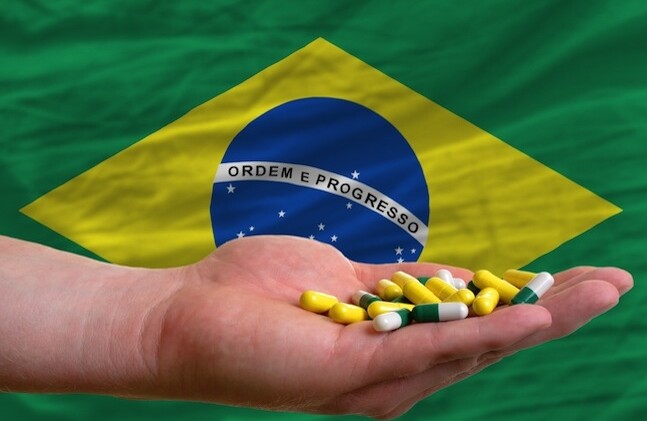Few countries in the world match Brazil's pledge to provide universal, free health care as a constitutional right. This promise extends far beyond routine check-ups. For example, in 2012, the Brazilian government announced that it would bear the costs for replacing defective silicone breast implants from French company PIP and Dutch company Rofil. These brands—now banned in Brazil—had a high rate of rupture because of the inferior quality of their materials. The Brazilian Ministry of Health identified this as a public health issue. It declared it would fully cover implant replacement costs, including for implants originally made for aesthetic reasons and carried out under the private health system, as long as rupture in the silicone was detected. Along the same lines, the government provides free weight-loss surgery for obese citizens over 16 years old and as of 1996, free medicine for HIV patients.
Why has the Brazilian federal government adopted such policies?
In Brazil, public health has a political and social agenda driven by various sectors of society, such as labor unions, institutional committees, and political parties, among others. In the 1970s, while the country was still under military dictatorship, public health became part of the public debate, promoted by left-wing social movements as part of the broader spectrum of discussions over democratization. These movements pushed for the reduction of social inequalities and the establishment of political and legal rights to promote these goals.
As a result, health care is a right for every citizen and a duty for the government, as established in Brazil's 1988 Federal Constitution. Health is simultaneously a social and a fundamental constitutional right, and cannot be removed by any amendments. Among the constitutional principles to be observed in the implementation of health policies are universality and equity. The former secures access to health for the population as a whole; the latter allows equal treatment for the population while allowing inequality to be taken into account: resources are expected to be made available to geographic regions and sectors of the population that need them the most. The Brazilian government is obligated to provide free universal health care for its population, regardless of income.
The 1988 Constitution led to the creation of the Unified Health System (SUS). Through SUS, access to free and universal health care has been decentralized to states and municipalities, as well as expanded to areas where it was scarce; regulation has been strengthened to enhance cohesion throughout the system; and health boards made up of representatives of civil society, health service providers, and experts oversee the allocation of funds. SUS is financed by funds from the federal, state, and municipal governments, using 15 percent of municipalities' total collected taxes and 12 percent of state taxes. The federal government is not required to contribute a fixed percentage, and as a result its support varies; a draft bill (PLP 321-2013) currently before Congress, proposed by more than 100 civil society, religious, and governmental entities, would increase this contribution to 10 percent of the total federal budget.
Comprehensive care focused on the prevention of diseases is another constitutional principle. This does not imply providing less health care for patients who are already ill. The state has a duty to provide treatment for diseases and, where not possible to provide a cure, to enhance the quality of life for patients. An example of preventive measures is free vaccinations against hepatitis, yellow fever, pneumonia, influenza, and HPV, among others. More than 90 percent of all vaccinations in Brazil are made through SUS. Furthermore, the Ministry of Health recently negotiated with the food industry for the reduction of salt and sodium in three products: baguettes, buns, and instant noodles. As a result, there was a decrease of 1,295 tons of sodium consumed in 2013. The goal is to ban more than 28 tons of sodium from various industrialized products by 2020.
However, in a country with 200 million people, implementation of the constitutional right of universal and equitable access to health is anything but easy and the ideal does not always match reality. In the case of silicone breast implants, for example, the governmental decision to bear surgery costs has added to the already long queue of cancer patients in the public health system waiting to benefit from mammary reconstruction.
The constitutional right of equity of access to health also leads to distortions: individuals who can afford judicial costs file lawsuits requesting the government to provide them with free medications that are not on the official list, or treatments not available in the system. Numerous judicial decisions have determined that the government should bear such costs. This leads to a conflict between public health priorities for the entire population as established by the executive branch vis-à-vis the demands of certain individuals: the judiciary provides unlimited access to limited public resources, thereby benefiting some individuals at the expense of the collective. According to a study by the Health Department of the state of Sao Paulo, individuals who either pay for private health insurance or attend private health clinics file two thirds of lawsuits requiring the state government to pay for medications or medical treatments. In such cases, constitutional equality might lead to inequality: scarce resources are taken away from the majority of society to the benefit of a small number of socioeconomically advantaged individuals.
Aside from that, expenditure on public health by the Brazilian government is still considered low: data from the World Bank shows that it corresponds to 4 percent of GDP, less than private expenditure in the health sector, which is around 5 percent of GDP. Furthermore, other countries providing universal public health care, such as the UK, devote at least 7 percent of its GDP to this sector. The shortfall in public health care investments in Brazil produces innumerable negative outcomes. Among those are:
1) unsatisfactory remuneration for doctors leading to a shortage of general practitioners in the public sector, which, in a controversial initiative, has led the federal government to hire professionals from Cuba;
2) lack of specialists, leading to a bottleneck in moving forward with treatments;
3) lack of infrastructure for the provision of services, equipment, and supplies;
4) excessive bureaucracy leading to low efficiency.
As a result, SUS has not been able to evolve in terms of quality and is considered to be a last resort, used only by those from lower socioeconomic levels who cannot afford private health insurance plans.
Is the situation in Brazil's public health sector hopeless? The answer is no. According to indicators by the Brazilian Interagency Network on Health Information (RIPSA), from 1990-2012, reported cases of malaria and tuberculosis in Brazil decreased from, respectively, 3.28 to 1.21 and 51.75 to 37.28 (per 100,000 population). Infant mortality has also steadily decreased from 113.9 for every 1,000 newborns in 1975 to 26.1 in 2000 and 15.3 in 2011.1 One of the programs created by the federal government, Farmácia Popular, provides affordable medicines for the most common diseases in accredited pharmacies throughout the country. The Ministry of Health has established a list of more than 100 medicines that receive up to 90 percent discount off their original price and are sold at cost value. This program benefits around 6.8 million people per month. In addition, a program called "Health is Priceless" provides free medications against hypertension, asthma, and diabetes. It has benefited 19.4 million people from 2011-2014.
Among the most populous nations, Brazil is the only one offering a universal health care system. The Ministry of Health claims that, per month, SUS provides 500 million medical consultations, 30 million oncologic procedures, and 1 million hospitalizations. SUS is the largest public system of transplants in the world, performing 95 percent of the total related procedures and surgeries in Brazil.
Requirements for the improvement of Brazil's public health system are twofold: the quality and quantity of services must be addressed. To do this, additional financial and human resources are essential. Brazil has only 1.8 doctors per 1,000 inhabitants and most of them are located in the Southeast and South, leaving the remotest and more vulnerable regions without medical help. Lack of infrastructure affecting basic equipment and medications in clinics and hospitals is a serious issue leading to chaos in various municipalities. Quality of management also needs considerable progress to create better allocation of scarce resources and a reduction of corruption in the public health sector.
The ethical principles are already in place. But when it comes to completely realizing them, a long road lies ahead.
NOTES
1 Please see http://tabnet.datasus.gov.br/cgi/idb2012/c01b.htm ; http://tabnet.datasus.gov.br/cgi/deftohtm.exe?idb2012/d0202.def;and http://tabnet.datasus.gov.br/cgi/deftohtm.exe?idb2012/d04.def


